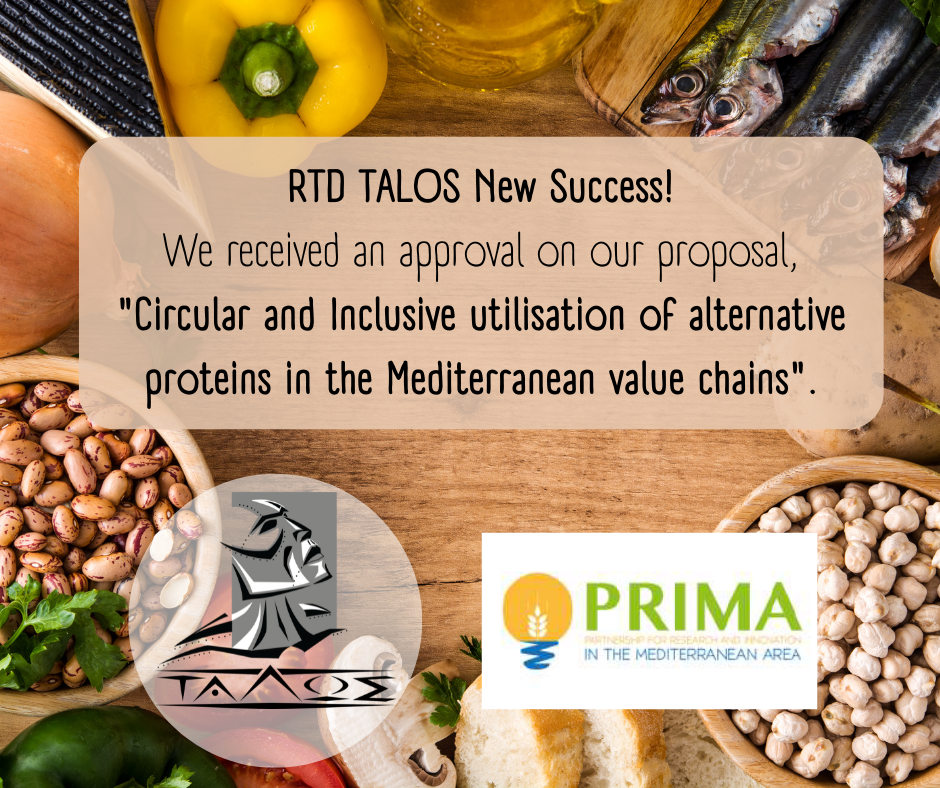
RTD Talos New Success!
We have been informed by the Committee of the PRIMA Program (Partnership for Research and Innovation in the Mediterranean Area) that our Proposal “Circular and Inclusive utilization of alternative proteins in the Mediterranean value chains” has been approved. .
The project has a total budget of €4.7E and in addition to RTD Talos, the following organizations participate:
Academic and Research Institutions
– University of Thessaly – Greece
– Deutsches Institut für Lebensmitteltechnik e.V. – Germany
– University of Bologna – Italy
– University of Turin – Italy
– Italian National Research Council – Italy
– Technion – Israel Institute of Technology – Israel
– Institut für Lebensmittel- und Umweltforschung e.V – Germany
Businesses and NGOs
– AlgaEnergy S.A. – Spain
– Next Protein – Tunisia
– SPAROS – Portugal
– Flying Spark – Israel
– AquaBio Tech – Malta
– ELVIZ SA – Greece
– Stolzenberger Bakery Germany
– Green Developmentand Innovation Association – Morocco
The play:
Current European agricultural production systems are highly dependent on protein imports to meet the nutritional needs of aquaculture and livestock, but also for human consumption. Therefore, there is an urgent need for the EU for efficient, sustainable and locally produced alternative sources of protein. In this context, the objective of the CIPROMED project is to increase the stability and resilience of Mediterranean agri-food production systems through the direct exploitation of locally produced traditional crops, as well as the utilization of proteins from locally produced agro-industrial by-streams (e.g. , spent grains, oilseed cakes) and the recycling and bioconversion of their extraction residues into protein produced by insects, legumes, microalgae and fermentation products for further use in the agri-food and feed sectors. Using a multi-stakeholder approach, CIPROMED’s activities will unfold through 7 Work Strands, in which insects and microalgae will be produced, utilizing agro-industrial residues and extraction side streams as substrates and applying innovative breeding and cultivation techniques to achieve higher protein yields. To close the loop, the insect body will be used as soil fertilizer for the production of legumes (lupins and beans). High-quality protein components from agro-industrial residues, insects, legumes and microalgae will be extracted for food and feed applications through economically and environmentally sustainable extraction processes. To achieve circularity, residues generated from extraction processes will be incorporated into diets formulated for rearing insects and cultivating heterotrophic microalgae, minimizing residual amounts. Microbial fermentation will be used to enhance the range, stability and health-promoting functionality of the new proteins. All protein ingredients will be fully characterized for nutritional value, functional and biological properties, as well as safety. Based on the results produced, new prototypes of food and feed products containing the new protein components will be formulated and validated using advanced and optimized processing technologies. Sensory and consumer tests will be conducted to evaluate all products based on improved food formulations and to assess market expectations. Animal (poultry) and fish feeding trials will be conducted to map the effect of the new protein ingredients on growth performance, nutrient digestibility and animal health. Human clinical trials will allow evaluation of the impact of foods containing novel proteins on satiety, faecal microflora, metabolic profile, as well as their safety. The safety and regulatory compliance of the produced processes and products, as well as their environmental and economic viability will be demonstrated through environmental analyses, such as LCA, SLCA and E-LCC. The improved socio-economic characteristics of the new Mediterranean agro-food production systems will be facilitated by integrating all sustainability data into an ecological design platform. At the same time, consumer attitudes and willingness to try, buy, pay and taste expectations for the developed new food products will be assessed through qualitative and in-depth quantitative consumer surveys and through sensory tastings with the newly developed products. The psychological, cognitive and emotional attitude and reactions towards new foods will be explored using a combination of explicit and implicit psychometric assessments. Finally, integrated business models and extensive exploitation plans for the produced products will be developed to effectively strengthen the market position of new products, created jointly with and for stakeholders and consumers. The end result of CIPROMED will be the production of highly sustainable, healthier, more environmentally friendly and not only affordable, but competitive food and feed formulations that will be available to all.
We thank: Cyprus Dietetic and Nutrition Association (CyDNA) the Cyprus Chamber of Commerce and Industry and the Cyprus Consumers Association for the letters of support
